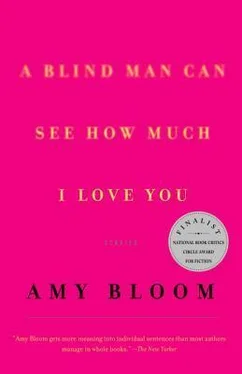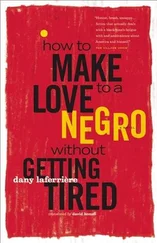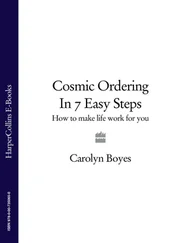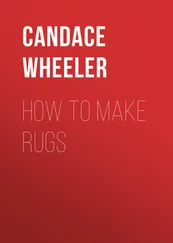And I am like a wife now to this lovely, talkative man who thinks me devoted and kind, who teases me for trembling at dead robins on the patio, for crying openly at AT&T commercials. And I am like a mother to this girl as rapacious and charming and roughly loving as a lion cub. The whole house creaks with their love, and I walk the floors at night, up and down the handsome distressed-pine stairs, in and out of the library and the handmade-in-England kitchen and through a family room big enough for anything but contact sports. In the daylight I make myself garden, fruit trees, flowers, and herbs, and it’s no worse than doing the crossword puzzle, as I used to. I’ve taken a bookkeeping class, and we don’t need an accountant anymore. I don’t write so much as an essay for the library newsletter, although I still volunteer there, and at Miranda’s school, of course, and I keep a nice house. I go to parties where people know not to ask writers how it’s going, and I play quite a bit of tennis, in nice weather, as I always have. And although I feel like a fool and worry that the teacher will sense that I am not like the others, I go to tai chi twice a week, for whatever balance it will give me. I slip into the last row, and I do not look at the pleasant, dully focused faces of the women on either side of me. Bear Catching Fish, the teacher says, and moves her long arms overhead and down, trailing through the imaginary river. Crane, and we rise up on one single, shaky leg. At the end of class we are all sweating lightly and lying on the floor in the dusty near-dark of the Gelman School gym. The floor smells of boys and rubber and rosin, and I leave before they rise and bow to each other, hands in front of sternum, ostentatiously relaxed and transcendent.
In the northwest corner of our property, on the far side of the last stand of skinny maples, I put up twin trellises and covered them with Markham’s pink clematis and perle d’azur, and Dutchman’s-pipe, for its giant heart-shaped leaves. I carried the pieces of a large cedar bench down there one night and assembled it by flashlight. I don’t go there when Sam or Miranda are home; it would be unkind, and it would be deceitful. There is no one in this world now who knew my little boy or me when I was twenty-eight and married four years and living in graduate housing at the University of California at Berkeley. When Eddie was a baby we lived underneath a pale, hunched engineer from New Jersey, next to an anguished physicist from Chad and his gap-toothed Texan wife who baked cornbread for the whole complex, and across from a pair of brilliant Indian brothers, both mathematicians, both with gold-earringed little girls and wives so quick with numbers that when Berkeley’s power went out, as it often did during bad weather, the cash registers were replaced by two thin, dark women in fuchsia and turquoise saris rustling over raw silk cholis, adding up the figures without even a pencil. Our babies and toddlers played in the courtyard, and the fathers watched them and played chess and drank beer, and we all watched and brushed sand out of the children’s hair and smoked Marlboros and were friends in a very particular young and hopeful way.
When Eddie died, trapped inside that giant ventilator, four times his size without being of any use to him or his little lungs, they all came to the funeral at the university chapel, and filled our apartment with biscuits and samosas and brisket and with their kindness and their own sickening relief, and we left the next day like thieves. I did not finish my Ph.D. in English literature, my husband did not secure a teaching position at the University of San Francisco, and when I meet people who remember Mario Savio’s speeches on the steps of Sproul Hall and their own cinder-block apartments on Dwight Way, I leave the room. My own self is buried in Altabates Hospital, between the sheet and the mattress of his peach plastic isolette, twisted around the tubes that wove in and out of him like translucent vines.
I have made the best and happiest ending that I can in this world, made it out of the flax and netting and leftover trim of someone else’s life, I know, but made it to keep the innocent safe and the guilty punished, and I have made it as the world should be and not as I have found it.












